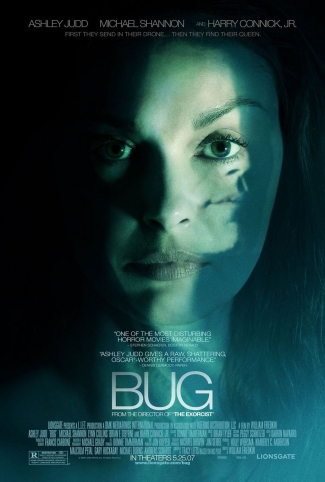
BUG
US, 2006, 90 minutes, Colour.
Ashley Judd, Michael Shannon, Harry Connick Jr, Lyn Collins, Brian F. O’ Byrne.
Directed by William Friedkin.
Is this the William Friedkin who won an Oscar for The French Connection all those decades ago, then made The Exorcist? Is this the William Friedkin who has never really matched these earlier successes? Well, yes. And this film does not match them either. But it will have a lot of people talking.
Bug sounds like one of those B-budget science fiction and/or horror movies of the 1950s or the cut-rate animal disaster thrillers of the mid-70s. And, for a lot of the time, that really seems relevant.
While a momentary clue or two is given early, a long part of Bug is confined to a motel room in the middle of nowhere, USA, where Aggie (a severely deglamourised Ashley Judd) lives alone, dreads the release from prison of her ex (Harry Connick Jr), relies on drugs and booze, has a friend or two from the bar where she works and tries to console herself with the memory of her abducted son. Doesn’t sound much like a Bugs movie. Warning, beware the temptation to leave!
A stranger visits (Michael Shannon). He is reticent, wary of women but polite and considerate. Now for the bugs. But, better you find that out for yourselves because this is a movie that is likely to win a cult status.
Paranoia rampant… and then some.
Readers of the National Enquirer and its imagination-defying sensation-revealing ilk may well take offence
at the send-up of the most bizarre hypotheses (about bugs as well as the CIA) and the welter of conspiracy theory conjectures that this throws up as if they are deadly real. And the screenplay has the courage of its convictions, and Friedkin has never been a director to cinematically shirk slapping us in the face. The final ten minutes are definitely worth seeing, either to believe or disbelieve, and, while Michael Shannon is a good sport to undergo all the torment that he does, Ashley Judd has some of the best hysterical scenery-chewing outbursts in a long time. And what she says will make you shudder at infectious paranoia and madness.
The implications of this film may well bug you.
1.The expectations from the title, the tone? How were they fulfilled?
2.The title, its sound, implications? The science fiction and horror films of the 1950s? Science fiction, invasions from outer space, human victims, threats to society? As seen in the 21st century, science, fiction? Madness and paranoia? Conspiracy theories? The background of the big-budget films – in the 21st century: cast, locations, technical and special effects? Musical score?
3.The intentions of the film-makers, entertainment, science horror for the fans? Variations on the theme? Contemporary America, its fears and paranoia? Hysteria? Conspiracy theories, beliefs, the effect on the population, these theories being infectious and destructive?
4.The first half of the film and its mood, the focus on Aggie, the motel, the build-up? The glimpses at the beginning of the man lying in the aluminium? The final glimpse? The helicopter shot descending to the motel?
5.The Rustic motel, its name, drab? Aggie outside, the phone calls? Ashley Judd, her appearance, slatternly manner, living along, the phone ringing and no-one speaking, her expecting it to be her ex-husband, Jerry? Her angers? The introduction to her and her character? Going shopping – and the memories of the abduction of her son, her grief? Her ex-husband, brutality, attempting to kill her? His imminent return? Her work, the bar, R.C. as her friend? R.C. bringing Peter back to the motel? Her going to the party? His staying?
6.Peter as laconic, his story about the military, his decision to stay, his reticence? The impact on Aggie? His staying the night on the couch, on the floor? Jerry and his sudden appearance, the shower and shaving, the confrontation, hitting Aggie? The background of their relationship? His taking her money? His enquiries about Peter?
7.Peter, his character, staying? The sexual encounter? The introduction of the bug theme? Aggie not being able to see the bugs? The audience visualising the bug and the bugs in the bloodstream? The sounds, the helicopter sounds, the flashing lights? Bugs and the detailed analysis and naming of the various bugs? R.C. and her participation? The search of the bed, the bites, their increasing, and Peter’s torso? The bites appearing on Aggie? His anger and walking out on her, her grief, his return, his explanation, the story of the doctors, the implants, the gulf? The CIA conspiracies, the government? The microscope and his examining the bugs, Aggie beginning to see them? The decision to clean the house, all the equipment, the set-up? Aggie and her being infected with this belief?
8.Jerry and his return, the clashes, Peter and the microscope, Jerry and his disbelief, his being ousted? His later returning at the fiery culmination?
9.R.C., her character, the lesbian background, the adoption of the child? Aggie and her relationship, ordering her away? Their having visited the doctor, telling him, getting the lotion for the rash? R.C. wanting to ring the police? Aggie and the beginnings of her paranoia?
10.The aluminium, the enclosed rooms, each of them getting madder?
11.The doctor, his arrival, his seeming innocence, yet seeming sinister, his promise of information about Lloyd? Pete killing him with the syringe, calling him a robot? The building up of tension and the drama?
12.The final frenzy, Pete and his encouraging Aggie to her theories, the weird conclusions, blaming R.C., blaming the doctor? Her absorbing all the paranoia herself? Their stripping, putting the fluid over themselves, the final conflagration?
13.The popularity of this kind of theme – and the strength of convictions of the film-makers to go the whole way with their film and its implications?